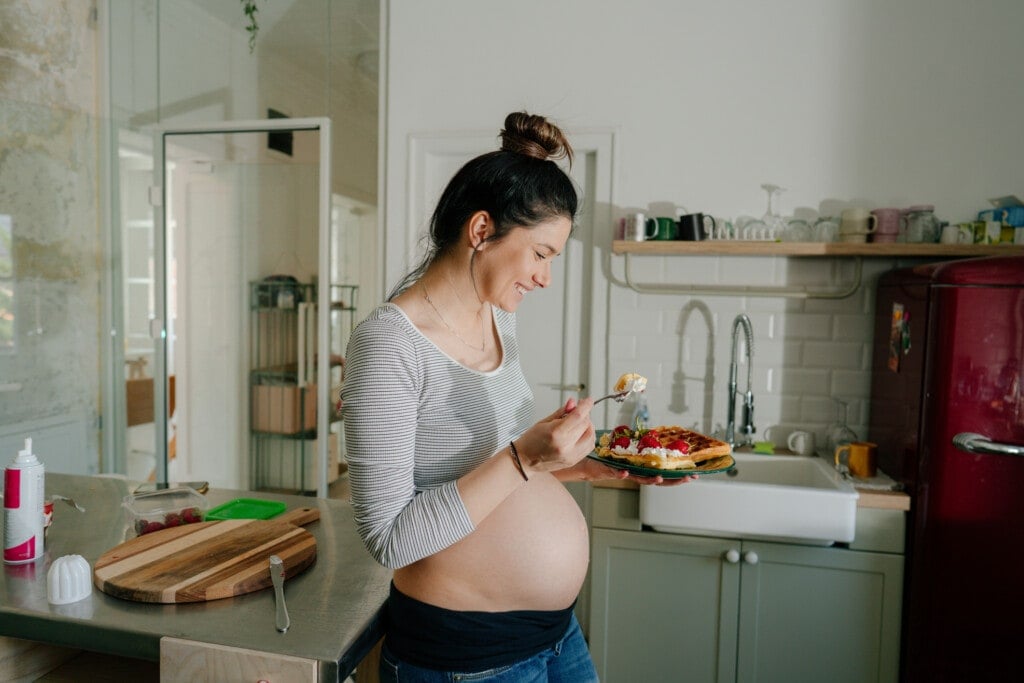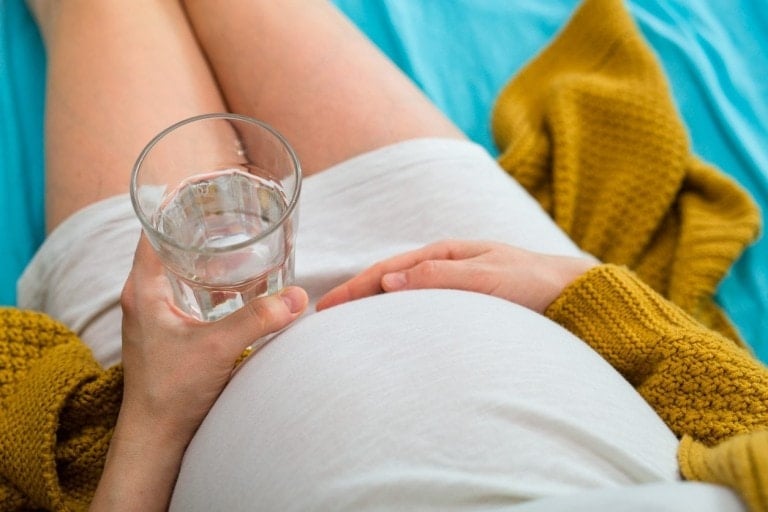Energy can be hard to come by when you’re pregnant. However, although you may feel hungrier than usual, alongside feeling fatigued, you do not need to eat for two. This common myth stems from the belief that your body needs and craves extra calories when pregnant. Realistically, you only need a few hundred more calories per day in the final two trimesters!
Pregnancy is often associated with times of giving in to cravings, not worrying about your weight, and “eating for two.” This encouragement can lead women to think they can pamper themselves by eating anything they want because their body, their baby, or others tell them they should. Many women in the U.S. consume more calories per day during their pregnancy than necessary, contributing to unwanted weight gain.1 But the cost of the pampering and extra help that pregnant women receive (and rightfully so), paired with eating more, can outweigh the good for both mom and baby.
Match Your Calories to Your Growing Baby’s Needs
The current Institute of Medicine guideline for caloric intake during pregnancy is no increased intake during the first trimester.2 So, not only should you not eat for two, but you should also not increase your calories. In the second trimester, you only need an additional 340 calories per day and an extra 450 calories per day from baseline in the third trimester. It is also important to remember that excess maternal weight gain in the first trimester can lead to gestational diabetes and increased risk for preterm birth, high birth weight, and other complications.3,4
First Trimester
The scientific reasoning behind caloric increase during pregnancy varies per trimester and is to stay along the baby’s growth pattern.5 The baby develops its vital organs and central nervous system during the first trimester. This is not a time for weight or height gain for the baby; that is why they do not need excess calories outside what is normal for the mom. It is essential to include foods high in folic acid and iron and stay on track with your prenatal vitamins.6
See also: Healthy and Delicious First Trimester Recipes
Second Trimester
The second trimester brings further functional growth, weight gain, and nutrient storage. This is a time to increase your daily intake by having an extra healthy snack every day or having a larger portioned meal for breakfast or lunch. Remember, the second trimester only requires 340 calories daily, so a snack will fulfill that! 340-calorie snacks include fresh veggies and hummus, a banana and a serving of peanut butter, or a small cup of yogurt and berries.7
See also: Healthy and Nutritious Second Trimester Recipes
Third Trimester
The last trimester is when the baby puts on the weight and prepares to enter the outside world. During this time, an additional 450 calories are appropriate. They can be met by having extra calorie-dense snacks, like nuts. Or by having a more significant portion of protein and healthy fats at dinner. By incorporating extra calories into foods you usually eat, you are more likely to not have calorie-dense cravings later in the day, like ice cream and baked goods.
See also: Healthy and High Energy Third Trimester Recipes
Medical Recommendations for Weight Gain Vary
We’ve discussed weight gain during pregnancy and the possible side effects excess weight can cause to both mom and baby when you eat for two. But what is normal? Current medical recommendations vary and are based on starting weight. This can be complicated if a mother does not know she is pregnant or does not get her weight taken regularly. Using the latest recorded weight a mom-to-be has, doctors can recommend a weight gain goal during each trimester.8
For those whose BMI is considered underweight, the recommended total weight gain is 28-40 lbs. Weight gain should be around 25-35 lbs for someone with a normal BMI. For overweight individuals, the recommended weight gain is 15-25 lbs., and for obese it’s 11-20 lbs. Overall, your healthcare professional should monitor your weight gain. It can be dependent on many factors outside of food but being able to determine your own caloric needs is a great tool to use when having cravings.
Cravings are Perfectly Normal
Let’s dive into cravings a bit more. It can sometimes seem like the baby wants pickles and milkshakes every day for the next nine months. These cravings can seem odd and may consist of foods you wouldn’t normally eat. However, psychological factors contribute to cravings, and feeling like “eating for two” is the only way out.9 Cravings are a way of compensating for possible dietary inadequacies and aversions. They can also be the result of learning which foods produce feelings of well-being or the happy hormone dopamine. According to this theory, people crave certain foods because they have learned that they feel good when they consume them. You’re not crazy, cravings are normal, and you can control them with a healthy diet.
Remember to Take Care of Yourself
Pre-pregnancy BMI, health status, and daily habits often continue into pregnancy. Therefore, taking care of yourself before becoming pregnant can improve the baby’s outcomes and allow for appropriate weight gain and health in the mom.10 A healthy diet that consists of high-quality protein, fruits and vegetables, and whole grains before pregnancy makes eating for one (with a bit of extra love) a whole lot easier.11 If the only food you can get down every day of your first trimester is bread, that’s okay. Just remember to take your prenatal vitamins and stay hydrated! Water also helps with feelings of excess hunger and prevents cravings for salty foods.
The harsh societal expectations that mothers should “bounce back” after birth can cause so much harm to both baby and mom. You are growing a whole human inside of you, and that takes a lot of work and self-care. Give yourself the space and routine you need to have a healthy pregnancy, with a healthy weight gain and healthy meals. You’re not eating for two; you are growing and evolving alongside your baby!






























